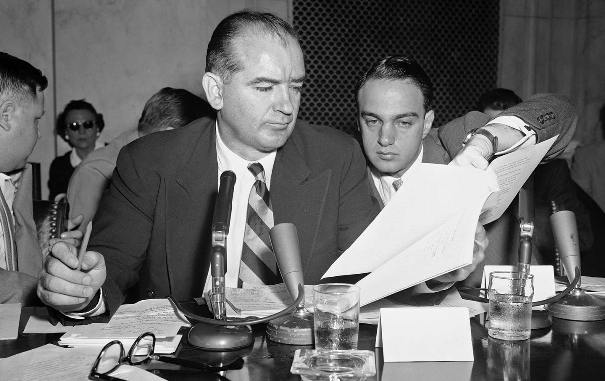 Emile de Antonio’s 1964 documentary about the Army-McCarthy hearings of ten years earlier, was one of the first directly political documentaries of any scope in the U.S.
Emile de Antonio’s 1964 documentary about the Army-McCarthy hearings of ten years earlier, was one of the first directly political documentaries of any scope in the U.S.
The 1954 Army-McCarthy hearings were among the first government hearings to be televised live, providing a spectacle rivaled only by the much later Watergate hearings. Ten years after this, in 1964, the maverick documentary filmmaker Emile de Antonio edited the six weeks of kinescopes into an hour and a half film called Point of Order!, and it remains the most enduring record of what people are talking about when they use the word “McCarthyism.”
Senator Joseph McCarthy of Wisconsin made himself famous by claiming to expose Communist infiltration in the highest reaches of government. He was not alone. Republicans used anti-Communism as a weapon against opponents, a tool to instill fear in the public, and as a method of political advancement after the end of World War II. In 1954, after this had been going on for seven long years, the Secretary of Defense charged that McCarthy and his assistant, Roy Cohn, had attempted to improperly influence the Army in its treatment of a private who had been a member of McCarthy’s staff. McCarthy charged that this was a smoke screen to keep his investigative team from exposing Communist infiltration of the Army.
The early stages of the hearings focus on the rather bewildering issue of this former staff member. But as time goes on, the real issue emerges—a struggle between McCarthy and those who were weary of his accusations and wished to discredit him as a fraud. The film provides a fascinating glimpse of the famous senator—with his snide manner and impressive, intimidating vocal delivery, it is easy to see why he captured the spotlight.
Eventually the hearings came down to a duel between McCarthy and the Army’s counsel Joseph Welch, a folksy, plain-speaking lawyer who was not above using sarcasm while sparring with the senator. McCarthy’s viciousness became more and more pronounced, and when he pulled one of his underhanded tricks—revealing that one of Welch’s young assistants (who was not at the hearing) had done work for a group that had defended Communists in the 40s, Welch responded with the withering speech beginning with “Have you no sense of decency?” that became legendary. It’s great theater, and a great education in how dishonest political rhetoric poisons the democratic process. McCarthy self-destructed at the hearings, and at the end of the film he is ranting and raving into the microphone while everyone is walking out. The Senate censured him soon after. He was finished, and he died three years later.
Of course the damage to the country had already been done, thousands of lives and careers ruined, and the struggle continuing, even up to today. Whenever a politician implies that his opponents (or those who protest and dissent) are a threat to national security, McCarthy’s heritage continues.
It helps to know a little bit of the history before watching Point of Order. There is no narration. Antonio lets the events and participants speak for themselves. It’s a no-frills kind of movie, but also one of the first directly political documentaries of any scope in the U.S. In addition to being an invaluable record of a pivotal moment in modern American history, it demonstrates how television had become a force to be reckoned with on the political landscape.

I’ve mentioned before how films will come and go, sometimes disappearing after only a week, so that I don’t have a chance to review...

A dark comedy that stretches across the 20th century in Yugoslavia, Underground is a film of excess that laughs derisively at the colossal waste...

A brother and sister, their addict mother in jail, try to get by under the poverty line in a depressed southern Ohio town, and...